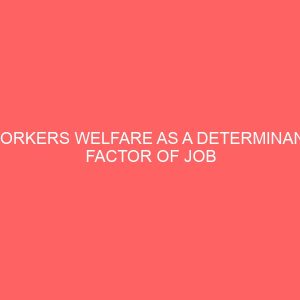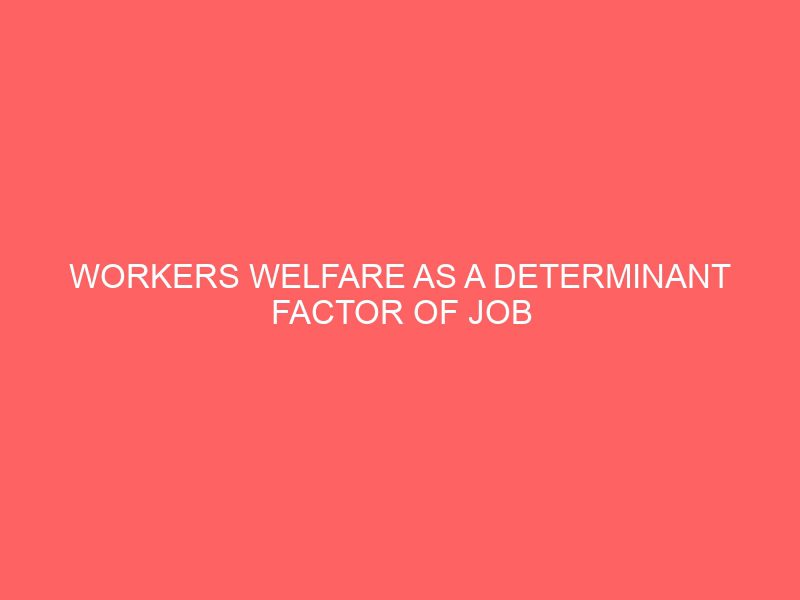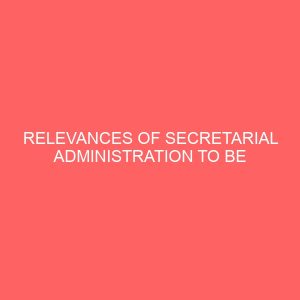Description
CHAPTER ONE
1.0 INTRODUCTION
1.1 BACKGROUND TO THE STUDY
Job satisfaction can be grouped as (i) statutory (ii) voluntary and (iii) mutual. Statutory measures are the legal provisions connected with employee welfare, working environment and health factors. The employer can fix certain minimum norms through rules and regulations. Voluntary measures are connected with employee welfare which comprises all those activities that employers undertake for their employees on a voluntary basis. Mutual measures are the welfare activities that are undertaken by the employees themselves. Efficiency of employees is directly and indirectly linked with the conditions and the environment under which employees are required to work. Even the most sincere employee cannot contribute to his best if he is uncomfortable. On the contrary, his productivity is likely to increase when he is comfortable at the working place and welfare amenities. Provision of adequate welfare facilities will go a long way in the improvement of morale of employees and consequent increase in their efficiency and reduction in cost management.
When considering job satisfaction, probably the most important point to bear in mind is that many factors that affect it. What makes workers happy with their jobs varies from worker to workers and from day to day. Apart from the factors previously mentioned, job satisfaction is influenced by the employee’s personal characteristics, the manager’s personal characteristics and management style, and the nature of the work itself. Manager who want to maintain high levels of satisfaction in the workforce must understand the needs of each member of the workforce.
There are some facets of job satisfaction. These include ability utilization, achievement, advancement, authority, company policies, compensation, co-worker relation, creativity, independence, moral values and so on (Ahmad, et.al, 2012). These are important determinants for the job satisfaction of employees. These factors directly and indirectly affect the employee?s job behavior and their level of satisfaction. For example, if an employee feels that he is not paid sufficient salary or he is deprived of his actual salary, then the employee becomes frustrated and his job satisfaction level goes low. Similarly, if an employee feels that his working environment is not suitable, then his job satisfaction goes low. So, the main requisite of job satisfaction is the higher pay and good real opportunity for promotion, considerate and participative management (Islam, et.al, 2013). In practice, these factors are not only controlling phenomena of job satisfaction rather several extrinsic and intrinsic factors directly and indirectly influence and affect the job satisfaction of the bank employees. Moreover, the performance of banks mainly depends on the level of the employees? job satisfaction.
1.2 STATEMENT OF THE PROBLEM
The problem facing most organizations in Nigeria, especially the public sector, is how to satisfy their workers to enhance productivity in the ministry, over the years, has suffered from low productivity, ineffectiveness, inefficiency, and lack of growth. This is as a result of non-motivation of the civil servant. Insufficient pay, lack of status and other related factors. This can lead to one of the following:
Incessant rate of strike in the public sector is quite alarming, workers demand for increment in salaries and allowances are denied. Thus, resulting to poor dedication to duty. Lateness to work is always a dominant factor to contend with in the public sector organization. This can be as a result of lack of supervision of workers, non?challant of superior officers to carry out punitive measures against this negligent act. Higher absenteeism is becoming a normal routine in the organization as no one takes up the duty of checkmating. Everyone is his own boss, no restriction of movement, no specific time of coming to work and time of leaving.
The above mentioned factors are all dissatisfaction on the job, because if individual feels that he is been treated fairly from the outcome he receives, or the process used, he will be satisfied and put all his effort to move the organization forward.
1.3 OBJECTIVES OF THE STUDY
Job satisfaction is one of the top issues for management and organization researchers. This is an attitude which shows the level of being happy or unhappy with the workplace, work and organization.
Recognizing the above fact, this research will seek to find out to the effective job satisfaction. The following will be looked into:
1. To examine the impact of job satisfaction on employee?s performances.
2. To see the extent of relationship between workers welfare and job satisfaction.
3. To examine workers? welfare and see how it affects job satisfaction.
1.4 RESEARCH QUESTIONS
This work intends to find answers to the following questions:
1. Is there any relationship between workers? welfare and job satisfaction?
2. What impact does job satisfaction have on employee performance?
3. What is the effect of promotion on job satisfaction?
4. What effect does the policy have on job satisfaction?
1.5 SCOPE OF THE STUDY
This research tends to cover the workers welfare as a determinant factor of job satisfaction in an organization with particular reference to Ministry of Finance, Secretariat, Ibadan.
1.6 SIGNIFICANCE OF THE STUDY
This kind of study will assist in broadening understanding or the scope of knowledge of the following:
? It will contribute to the enrichment of the literature on job satisfaction.
? It will suggest ways (of interest to academics) based on empirical evidence of enhancing effective job satisfaction in Nigerian.
? The study will serve as a body of reserved knowledge to be referred to by researchers.
1.7 DEFINITION OF TERMS
? JOB SATISFACTION: Is a measure of workers’ contentedness with their job, whether or not they like the job or individual aspects or facets of jobs, such as nature of work or supervision.
? IMPACT: Is the strong effect or influence that something has on a situation or person
? EMPLOYEES PERFORMANCE: The job related activities expected of a worker and how well those activities were executed. Many business personnel directors assess the employee performance of each staff member on an annual or quarterly basis in order to help them identify suggested areas for improvement.
? ORGANIZATION: It?s an entity comprising multiple people, such as an institution or an association that has a collective goal and is linked to an external environment.
? WORKERS WELFARE: the efforts to make life worth living for workmen. According to Todd ?worker welfare means anything done for the comfort and improvement, intellectual or social, of the employees over and above the wages paid which is not a necessity of the industry
? WELFARE: The good fortune, health, happiness, prosperity, etc., of a person, group, or organization; well-being







